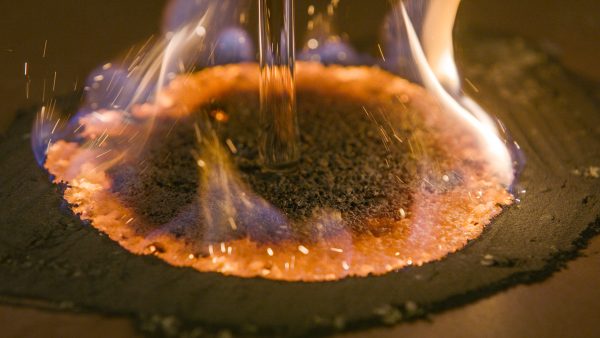Element Definition
An element is a pure substance made up of only one type of atom. For example, oxygen is an element essential for breathing.
View Lesson on Properties of Elements
Become a member to get full access to our entire library of learning videos, reading material, quiz games, simple DIY activities & more.
Become a member to get full access to our entire library of learning videos, quiz games, & more.
Plans & Pricingto watch this full video.

Access All Videos
and Lessons, No Limits.
Access All Videos

No credit card required,
takes 7 sec to signup.
No card required

Ready-to-go lessons
that save you time.
Ready-to-go lessons
If you are on a school computer or network, ask your tech person to whitelist these URLs:
*.wistia.com, fast.wistia.com, fast.wistia.net, embedwistia-a.akamaihd.net
Sometimes a simple refresh solves this issue. If you need further help, contact us.
Properties of Elements
Fun Facts
- Elements are naturally occurring substances that exist in all three states.
- Elements have properties like conductivity, magnetism, melting point, boiling point, and color.
- The element iodine is used as a skin disinfectant during surgery, while copper is used inside electrical wire to conduct electricity.
Why Do We Need To Know About Element
Learning about elements helps you understand how they are used and why they’re important in different jobs. For example, lithium is used to power things like your phone, showing how chemistry and technology work together in things we use every day.
Elements like fluorine and calcium are also important. Fluorine is used in healthcare, and calcium is used in building things. Knowing about elements can help you work in many areas, like being a doctor, an engineer, or creating new technology.
Frequently Asked Questions
Check out the Full Lesson on Properties of Elements
In this lesson, we learn that:
- Elements are pure substance made of only 1 type of atom.
- Each element has properties that can be used to identify it.
- All elements are arranged in rows and columns on the periodic table.
Related Topics
- Chromosome Definition
- Climate Definition
- Collision Definition
- Condensation Definition
- Definition Of Engineering
- Distillation Definition
- Earth’s Axis Definition
- Earthquake Definition
- Electron Definition
- Element Definition
- Environmental Factors Definition
- Gas Definition
- Germination Definition
- Glacier Definition
- Greenhouse Effect Definition
- Habitat Definition
- Heat Definition
- Insulator Definition
- Internal Structures Definition
- Lever Definition
- Limited Resource Definition
- Liquid Definition
- Magma Definition
- Matter Definition
- Melting Definition
- Meteorologist Definition
- Mold Fossils Definition
- Molecule Definition
- Natural Resource Definition
- Nervous System Definition
- Newton’s 2nd Law Of Motion Definition
- Partial Eclipse Definition
- Physical Map Definition
- Plant Growth Definition
- Problem Definition
- Rain Definition
- Seed Definition
- Seed Dispersal Definition
- Seismologist Definition
- Species Definition
- States Of Matter Definition
- Surface Runoff Definition
- Temperature Definition
- Thermal Energy Definition
- Tides Definition
- Transverse Wave Definition
- Water Definition
- Wind Erosion Definition
Start a Free Trial Today. Get a $5 Amazon Gift Card!
Teachers! Start a free trial & we'll send your gift card within 1 day. Only cards left. Try it now.
Select Grade
Select Subject
This email is associated with a Science Kit subscription. Kit subscriptions are managed on this separate page: Manage Subscription

-
Download InvoiceScience & Math$/yr
-
Download InvoiceScience Only$/yr

access all lessons
• No credit card required •
"My students loved the videos. I started the video subscription in May and used them as a review before the state test, which I know contributed to 100% of my class passing the state test."
Rhonda Fox 4th Grade Teacher, Ocala, Florida
• No credit card required •
"My students loved the videos. I started the video subscription in May and used them as a review before the state test, which I know contributed to 100% of my class passing the state test."
Rhonda Fox 4th Grade Teacher, Ocala, Florida
• No credit card required •
Already a member? Sign In
* no credit card required *

* no credit card required *
* no credit card required *


no credit card required
Skip, I will use a 3 day free trial
Enjoy your free 30 days trial
-
Unlimited access to our full library
of videos & lessons for grades K-5. -
You won’t be billed unless you keep your
account open past your 14-day free trial. -
You can cancel anytime in 1 click on the
manage account page or by emailing us.
-
Unlimited access to our full library of videos & lessons for grades K-5.
-
You won't be billed unless you keep your account open past 14 days.
-
You can cancel anytime in 1-click on the manage account page.
Cancel anytime in 1-click on the manage account page before the trial ends and you won't be charged.
Otherwise you will pay just $10 CAD/month for the service as long as your account is open.
Cancel anytime on the manage account page in 1-click and you won't be charged.
Otherwise you will pay $10 CAD/month for the service as long as your account is open.
We just sent you a confirmation email. Enjoy!
DoneWe use cookies to make your experience with this site better. By using this site you agree to our use of cookies. Click "Decline" to delete and block any non-essential cookies for this site on this specific property, device, and browser. Please read our privacy policy for more information on the cookies we use.Learn More
We use cookies to improve your experience. By using this site, you agree to our use of cookies. Click "Decline" to block non-essential cookies. See our privacy policy for details.Learn More



























































































































